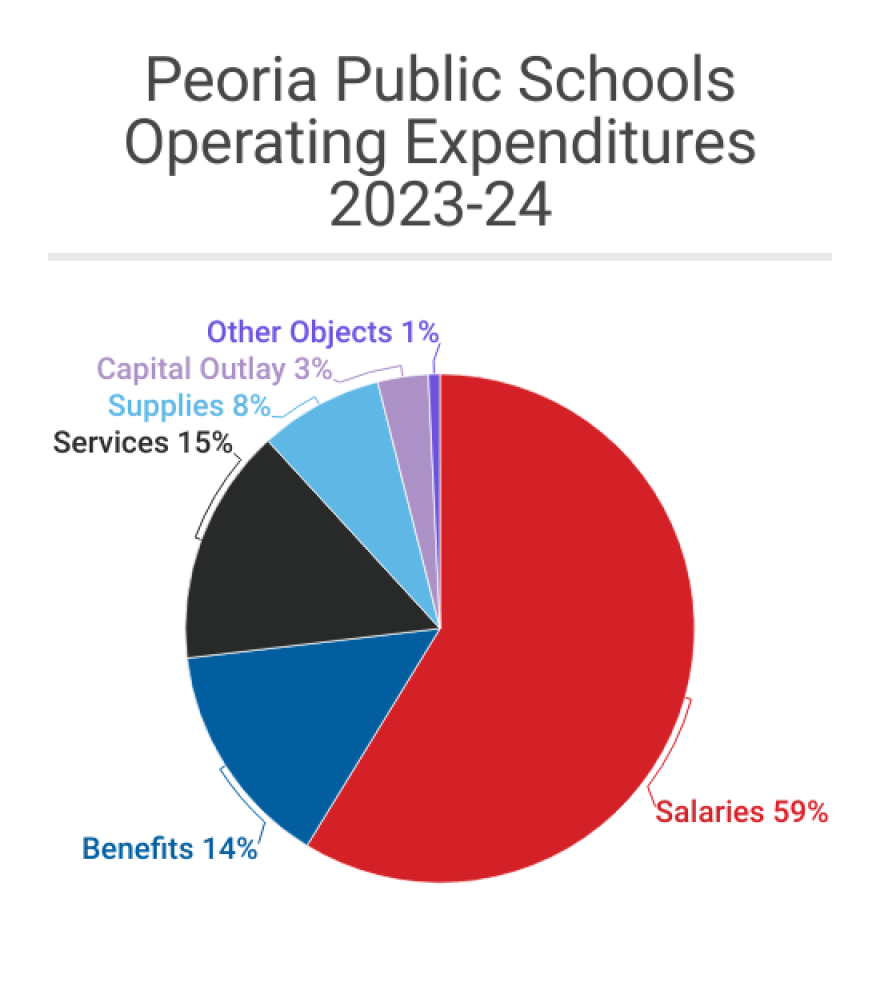Peoria Public Schools will be operating on a deficit under the budget proposal for the new fiscal year.
The board of education will vote on Monday whether or not to adopt the more than $317 million budget.
Chief Financial Officer Mick Willis said the deficit of more than $9 million for the year was planned. He said the district will be using leftover COVID-19 aid from the federal government to pay down various expenses.
Most of the expenses are one-time purchases, such as adding air conditioning units to schools without them, and upgrading heating, ventilation and air conditioning (HVAC) units.
“Monies came in ... the previous fiscal year that we didn't need that year, some of which we are tapping during the 23-24 year,” Willis said. “And that's true on the operating side of the budget. And that's true on the non-operating budget. We basically have money that we banked for later use, and when we use it later, it shows up as a deficit.”
The district also sold bonds to cover expenses from the upgrades. Paying those off will be included in the spend down plan.
Willis said the district will continue to operate on a deficit budget over the next couple years while paying off short-term costs, such as retention bonuses included in the teacher’s union contract.
The union and district negotiated a new contract last year.
“It's an expense that it's one time in nature,” Willis said. “Once you pay it, it goes away. And so we built into the 22-23 contract, 23-24 contract and 24-25 contract for teachers retention bonuses, that after 24-25 won't be part of our spending plan.”
Salaries and benefits are the only increasing expenses in the budget.

Willis said the district took in more money than anticipated from corporate personal property replacement taxes in the past three years. But those revenues are expected to fall again over the next few years.
The unexpected increase helped cover some expenses, particularly the teacher’s salary increases.
The district’s property tax revenues also were down this year, but Willis said there’s a reason for that, too.
“The property tax line was more of a case of we no longer need to have property taxes at the level that it used to be, because some of the stuff that it was funding is now fully funded,” he said.
Spending on supplies and building maintenance will decrease from the previous year’s budget. Willis said it’s mostly due to more spending on one-time purchases during the pandemic years.
“That spending was connected to the COVID relief funds that we got,” he said. “So this year, there wasn't a need to budget quite as much in the way of spending on those lines for that program with those receipts. And so that's why you saw decreases there.”
Those purchases included new textbooks and furniture for schools that won’t need to be updated for a couple years.
“If you spend money on them now, when you're done with the projects, you don't need to have a budget provision for those kinds of things any longer,” Willis said. “So, we tried to match the one time money up with one time projects. And so that's how we're managing the effect of someday we're not going to have that money.”

The district has until September 2024 to spend the remaining COVID-19 funds, meaning next year’s budget will have no extra aid from the federal government.
The district will still receive grants from both the state and federal government to fund projects, as well as its usual funding streams.
Willis said the end of the additional aid could mean that some programs started during the pandemic will have to end.
“I do know that we have had a number of instructional initiatives funded with that money knowing full well that you know if the program is of value, and we feel like it needs to be continued, we'll figure out ways to continue it,” he said. “But there were several things that we thought we could kind of temporarily offer some enhancements, knowing full well that when money dries up those enhancements or extra things we'd no longer provide.”
He said decisions will be made at a later time, and there are currently no plans in place to make program cuts. Willis said students and teachers shouldn’t feel much of the impact from the additional revenue losses.
“It's not like that because we no longer have that money, teachers will now not have supplies, because we were using that to fund supplies in the classroom,” he said. “There's the smart boards that we used that money for, to put in their classrooms. That money goes away, we're not going to rip out their smart board because that money went away.”
The budget is available for public viewing on the district’s website and in person at the administration building. Willis said he has not received any feedback on the proposal.


